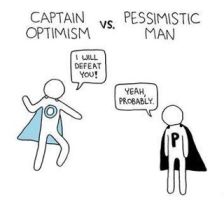
Optimism: Tendency to look on the more favorable side of events or conditions and to expect the more favorable outcome. (dictionary.com)
Pessimism: the tendency to see, anticipate or emphasize only the bad or undesirable outcomes, results, condition, problems, etc. (dictionary.com)
You can probably identify if you are an optimist or a pessimist. What is the first thought that comes to mind when something bad, or even not so great, happens? Is it “Oh great! This will ruin my whole day. I am depressed.” or “Oh dear. That’s too bad. I’m glad it was not any worse.”
See the difference. One thought can lead to a sour mood and negative attitude and the other leans toward the silver lining with a positive outlook. Both attitudes will change your day. Like I say How you do Anything is How you do Everything. If you tend to see things in a pessimist light, you will be anxious, worrisome and sometimes depressed. Things just never look good. Optimists usually see the brighter side, the upswing, the possible great things to come! They are generally more upbeat, excited, goal oriented and outgoing.
Some people believe they are a “realist” which basically means “Hope for the best, expect the worst.” Realists are pessimists with some hope. Hope that things will not always be terrible, but they still believe they will be terrible. A true realist can see things for what they are without prejudice or personal opinion. It’s harder to do that you think. Your personal world view is all about the perception of the event/situation which come from your self talk and your ongoing tapes derived from childhood and past events.

What makes an optimist?
In “Authentic Happiness” by Martin Seligman, he refers to pessimist thought as an automatic perception of a setback as “permanent, pervasive and personal: It’s going to last forever, it’s going to undermine everything and it’s all my fault.” Whereas an optimist may see the same setback as surmountable, particular to that problem, temporary and relative to others. An optimist can see a situation for what it is, who it is relative to and how it can be improved.
The NUMBER ONE act of an optimist is to take the situation as one instance in time. It does not explode to global proportions. They dispute the negative, pervasive devastation a pessimist might assume. “Wait, does this red light really mean I will be late to work, yelled at by my boss, have to stay late, possibly written up, loose an account….” Probably not. So, what does it mean? You can take a similar situation that has happened in the past to compare the current situation to. Disregard your emotional response, since it might have been exaggerated. What actually happened? When overwhelmed or anxious events, try disputing your own thoughts to replace with more realistic and positive ideas.
You can take an optimism test on Dr. Seligman’s website. There is more information on optimism and happiness.